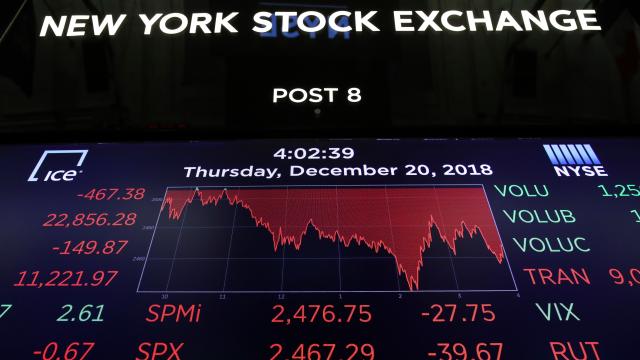The Nasdaq index, which includes major tech companies like Apple and Microsoft, fell into bear market territory at the close of the market last week, a term that signifies a loss of 20 per cent or more from its peak.
The Wall Street Journal attributes the decline to a “bevy of concerns, from the Federal Reserve’s pace of interest-rate increases to the health of the U.S. economy and a looming government shutdown.”
The Dow Jones and S&P 500 are also down, though not quite to bear-market levels yet. According to Reuters, the Russell 2000 and the S&P 600 small-cap index have confirmed that they are in bear territory over the past few days.
If stocks fall by 20 per cent overall this year, it will end the longest bull market on record, which began during the Great Recession.
According to the New York Times, there have been just two bear markets in the past two decades: One in 2000, in concert with the dot-com bust, and one with the financial crisis of 2007 (which most of us probably remember).
Per Reuters, the Nasdaq grew “more than 539 per cent from its post-financial-crisis low on March 9, 2009.
Including reinvested dividends, it delivered a total return of more than 611 per cent in that time.” Even with this drop, it’s still 400 per cent above that 2009 low.
For the average retail investor—that’s people like you and me—the advice is not to panic. You want to stay invested. But once a bear market begins, people tend to do the opposite: Panic selling is heightened, which only makes the bear angrier.
If you’re nervous about what the bear market means for the future, prioritise building up your cash reserves.
But remember, now is potentially an even better time to buy into the market, as I wrote before:
If you’re young and investing primarily through a 401(k), don’t think about it like a trading account that’s losing money, suggests Kevin Dixon, senior market analyst at Market Traders Institute. Think of it as your nest egg that leverages dips to buy cheaper stock. “You’re using the concept of cost averaging,” says Dixon. “You’re buying on the way up and on the way down.”
Historically, bear markets last under two years, while bulls run much longer. “If the market starts crashing, that volatility is opportunity that you only get once every seven to 10 years,” says Dixon.
Older investors close to retirement should take this as a sign to give their investments a tune up. “If you’re investing for a short-term goal, it might be time to start exiting the stock market—generally, you don’t want to invest money in stocks if you’re going to need the money in three years or less,” Andrea Coombes, Nerdwallet’s investing and retirement specialist, told me a few months ago.
And turn off (or tune out) anything that’s causing you overdue stress or worry. Yes, you need to stay informed, but fluctuations are normal. Here’s some reassurance from Kiplinger:
A market down 15 per cent does not translate into you losing all of your money. Don’t call your broker in a panic, afraid you have lost all your money. A market down 20 per cent in a month doesn’t mean that in four more months you will have lost everything.
Markets go up and markets go down. Investors tend to think that whatever the current environment is will go on forever (or at least for the foreseeable future). Bull markets will never have a top, and bear markets will never come back up.
Do yourself and your rep a favour and do not think this way. It will only make you crazy. Bear markets follow bulls and bulls follow bears. It has always been that way and always will.
Review your retirement plan and investing goals, see if you’re still on track and what a bear market would mean for your goals specifically and then take action as necessary.

Comments